March 2020
Dear Friends of the Center for the United States and Mexico,
Before reporting on our activities for the first quarter of 2020, I want to take a minute to thank you for your support of the center. We, the researchers and staff, greatly appreciate your confidence in our work, always, but especially under the present circumstances.
As the world faces a serious public health crisis, all of us at the Baker Institute and the Center for the U.S. and Mexico are following the appropriate measures to help contain the spread of the coronavirus. As we do so, we also continue to work — at a distance — and to carry out our mission: To provide research and analysis on the impact of events and policy decisions on the U.S.-Mexico relationship; and to deliver fact-based recommendations, ensuring that binational relations remain strong and can later help repair the damage to the political, economic, and social ties that this crisis will have likely caused.
Please review our home page periodically. We continue to publish research by our resident and non-resident scholars. We have also moved our events online in order to continue our conversations from the safety of our homes. We hope that you will benefit from our work in the days and weeks to come. We also hope that in the future, as this crisis subsides, we can eventually come together in the halls of the Baker Institute and thank you personally for your support.
Sincerely,

Tony Payan, Ph.D.
Director, Center for the United States and Mexico
 |
At the inaugural Mexico Country Outlook, His Excellency Jaime Serra Puche, chairman of SAI Law & Economics and Mexico’s former secretary of commerce and of the treasury; the Honorable Hugo F. Rodríguez Jr., deputy assistant secretary for Central America, Bureau of Western Hemisphere Affairs, U.S. Department of State; and an in-house team of experts examined the major challenges facing Mexico and forecast what companies can expect in 2020. The outlook, designed for businesses, corporations and investors, focused on Mexico’s politics, economic prospects, new regulatory environment, public safety and security landscape, and social conflict atmosphere, as well as the state of relations between the U.S. and Mexico. Attendees also received the Mexico Country Outlook 2020 report, which contains the information discussed at the conference. This was an exclusive, high-level fundraising and networking event. Click here for more information and photos.
Upcoming Event
Webinar: Mexico’s Response to the Coronavirus Pandemic
At this free online webinar, Tony Payan, director of the Center for the United States and Mexico, will discuss the coronavirus pandemic in Mexico and the country’s response and capacity to deal with it. Watch the webinar on April 1 at 1:00 pm by visiting the event page.
Past Events
Perspectives on Mexico's Economy
José Antonio González Anaya, former secretary of finance and public credit and former CEO of Pemex, discussed his perspective on the outlook for Mexico’s economy and oil sector. This event was co-sponsored by the Baker Institute Center for Energy Studies and Center for the United States and Mexico. Click here for photos of the event.
The USMCA and the Future of Trade in North America
At this event, David A. Gantz, Will Clayton Fellow in Trade and International Economics, Center for the United States and Mexico; and Robert T. Givens, member of Givens & Johnston — Customs and International Trade Law, explained the complexities of the USMCA and forecast its impact on both local and global trade. Click here for video and photos of the event.
The State of Tamaulipas: A Conversation with Gov. Francisco Javier García Cabeza de Vaca
The governor of Tamaulipas, Francisco Javier García Cabeza de Vaca, discussed plans to bolster the state’s prospects by fighting drug-related violence, improving public safety and increasing shale gas and oil production. Click here for video and photos of the event.
Recent Publications
Pandemics and Populism: Mexico’s Response to the Coronavirus
Mexico’s President López Obrador has largely discounted the threat of COVID-19. If conditions change for the worse, the president faces a national health crisis and the possible end of the country's populist experiment, writes center director Tony Payan in this Baker Institute blog post.
Infographic: What are the costs of border security and immigration enforcement?
Center infographics provide informative visualizations of issues affecting the United States and Mexico as well as the binational relationship. Click here to view the most recent infographic.
The USMCA: Carryover Provisions from NAFTA
In this Baker Institute report, Will Clayton Fellow David A. Gantz examines several provisions of NAFTA that have been carried over to the USMCA, including regulations for government procurement, trade remedies, temporary entry for business visitors, and general exceptions or limitations on the application of the trade agreement.
The Actors, Strategic Fields, and Game Rules: Examining Governance at the U.S.-Mexico Border in the Twenty-first Century
Who governs the U.S.-Mexico border? Tony Payan, center director, addresses this question in a chapter of the book “North American Borders in Comparative Perspective” (University of Arizona Press, 2020). The book is available here.
Lights Out in Mexico’s Upstream Market?
In this issue brief, nonresident scholar Miriam Grunstein tracks a change in the direction of Mexico’s energy policy under President Andrés Manuel López Obrador — one that inhibits private investment while attempting to restore Pemex’s oil monopoly.
Getting Public Investment in Education Wrong in Mexico
Mexico’s government should prioritize early childhood education, but its decision to reduce the budget and replace a childhood centers program for the disadvantaged indicates that it does not, writes graduate fellow Daniel Prudencio in this issue brief.
Improvising and muddling through: transnational government networks and security cooperation between Mexico and the U.S.
Largely informal networks of binational cooperation between government actors are effective, but depend on the determination and ability of individuals to create and maintain them. As a result, writes center director Tony Payan, this form of binational cooperation is vulnerable to variables in personality and changing political winds. Read his report in the Journal of Transatlantic Studies.
Conditional vs. Unconditional Antipoverty Programs in Mexico
Mexico's government has eliminated almost all conditions (health checkups, school attendance for children) previously attached to cash transfers for the poor. Center contributor Gregory S. Schober considers the impact of the antipoverty overhaul in this policy brief.
USMCA Provisions on Intellectual Property, Services, and Digital Trade
In this report, Will Clayton Fellow David A. Gantz analyzes the trade agreement's provisions on intellectual property, services and digital trade.